Why Does My Rabbit Have Diarrhea? 9 Vet-Explained Reasons & Treatments

Click to Skip Ahead
Your bunny has been hopping around normally, but you notice they’re having diarrhea. Is this diarrhea a concern, or will it pass on its own? You’re probably also wondering why your rabbit has diarrhea.
Let’s explore the differences between diarrhea and soft cecotropes, the causes of diarrhea in rabbits, and how to treat diarrhea in rabbits, both at home and through your veterinarian. It’s time to talk about rabbit poop!
Rabbit Stool 101
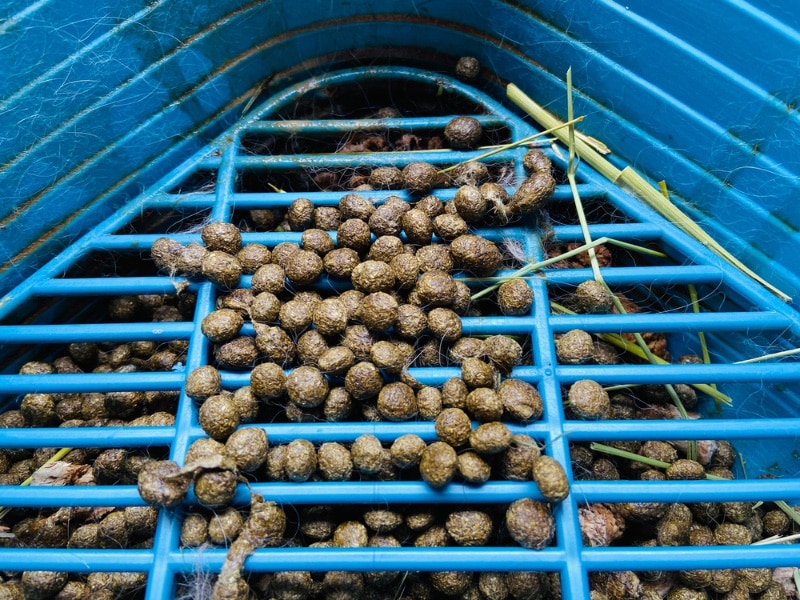
Rabbit stool should generally look like solid, round pellets. Diarrhea in rabbits is usually watery and unformed rather than discrete balls. It may be crusted around their rectal area or on their hind legs.
Your rabbit also produces cecotropes, pieces of stool formed within the cecum, a branch off the intestines. As gross as this might sound, rabbits eat cecotropes to get extra nutrients. For instance, cecotropes are high in vitamin B, which rabbits don’t create on their own.
It’s important to differentiate between normal stool and cecotropes because the cecotropes can be a little softer. In addition, there are different causes of soft regular stool and soft cecotropes.
The 9 Reasons Diarrhea in Rabbits & Treatments
1. GI Stasis
One of the most significant health issues plaguing pet rabbits is GI stasis. This condition is not generally associated with diarrhea but can be for some rabbits. With GI stasis, the rabbit’s gut contractions decrease, so food doesn’t move through readily. Because of the reduced motility, the gut bacteria also become unbalanced.
GI stasis is often painful and can cause gas. Treatment utilizes pain medication, fluids for the rabbit, and GI motility medications. Since GI stasis is commonly associated with rabbits not getting enough fiber, treatment generally involves supplementing with plenty of hay.
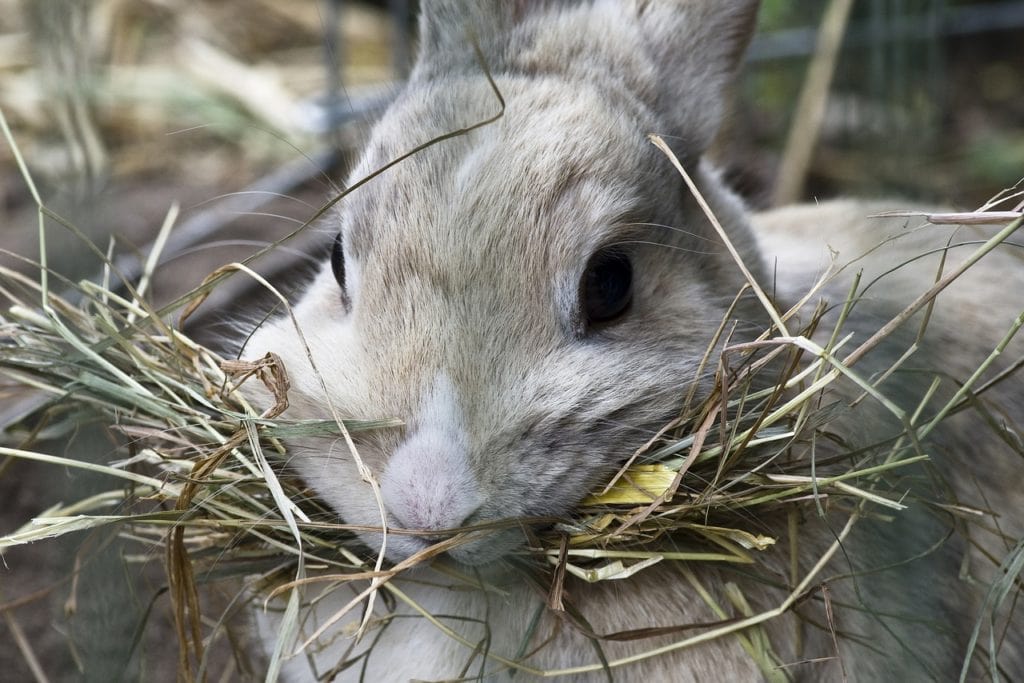
2. Intestinal Parasites
Rabbits are at risk of contracting several intestinal parasites. These parasites include:
Coccidia tends to be the most common intestinal parasite in rabbits. Young rabbits are especially at risk. A rabbit with intestinal parasites might not show any signs but might have diarrhea.
Treatment depends on the type of parasites. Your veterinarian will diagnose them based upon a physical exam and fecal exam, and treatment may include a dewormer or specific antibiotics, such as Albon, for coccidia.
3. Antibiotics
Your veterinarian must be very careful when prescribing antibiotics to your bunny. Some antibiotics are very strongly not recommended in rabbits due to the high likelihood that they will disrupt the normal populations of gut bacteria, which can lead to diarrhea.
Rabbit veterinarians typically don’t recommend certain antibiotics for rabbits, including:
If antibiotics cause your rabbit’s diarrhea, they need to see a veterinarian experienced with rabbit medicine as soon as possible. Your rabbit will likely need supportive care, such as fluids and a critical care diet.
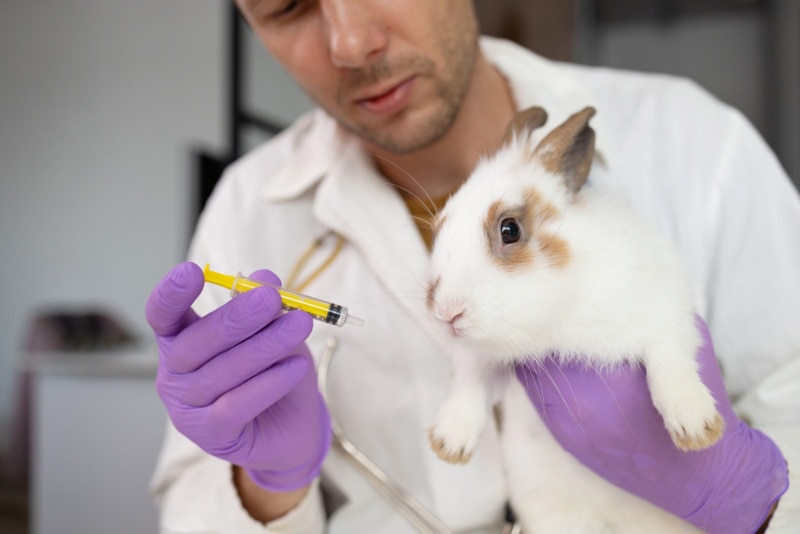
4. Infections
Your rabbit can be affected by viral, bacterial, and fungal infections. Some of these can cause diarrhea.
A virus causes rabbit hemorrhagic disease. Affected rabbits often die suddenly and may have signs of bleeding. Rabbits that don’t die quickly may have diarrhea and neurological signs.
Bacterial infections can cause peritonitis, which is typically painful and may cause the affected rabbit to exhibit GI signs. Certain bacterial infections can cause devastating gastrointestinal signs in bunnies, such as E. coli, Salmonella, and Clostridium piliforme.
Your veterinarian will determine treatment based on their tentative or confirmed diagnosis. Your rabbit may need cultures done to determine the cause of the infection. Treatment may involve supportive care, antibiotics, and pain medication.
5. Mucoid Enteropathy
Mucoid enteropathy is a condition with mucus accumulation within the intestines. Unfortunately, it’s not a well-understood condition. Pathogens, diet, and even stress may play a role in it.
There are a few treatment options, but the prognosis is poor for rabbits with mucoid enteropathy:
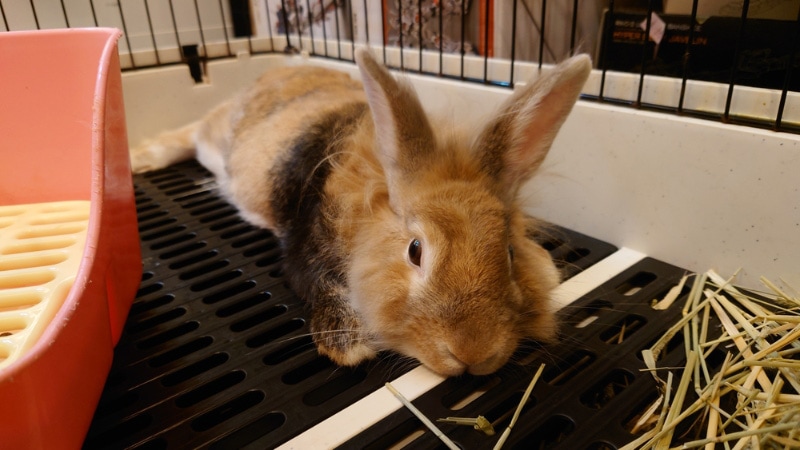
6. Diet
Feeding rabbits a diet not high enough in fiber is a quick way to cause gastrointestinal upset, diarrhea, and other issues like GI stasis. You’ll want to make sure they have plenty of hay and a limited number of pellets. Watch out that the fresh fruits and vegetables they get aren’t too high in moisture or sugar: both can cause intestinal disruptions.
For affected rabbits, you’ll need to increase their hay intake immediately. Ensure you’re only using alfalfa hay if directed to by your veterinarian because it is higher in protein and carbohydrates than your rabbits usually need and can cause GI issues.
7. Toxins
Unfortunately, there are lots of potentially toxic plants and chemicals that may be around your house. Some may produce diarrhea in your rabbit. Examples of plants you should be aware of include:
If you find your bunny has gotten into a potentially toxic plant or household compound like cleaner or poison, you need to contact your veterinarian right away. The type of treatment depends on what your little hopper has gotten into. It may be harder to treat your bunny than a dog because bunnies don’t–and can’t–vomit, so there’s no way to get the poison out of their system.
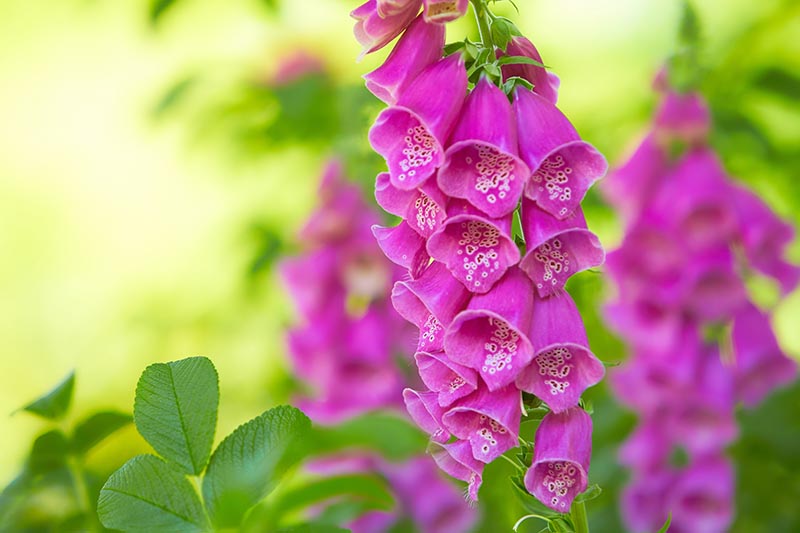
8. Chronic Diseases
Some diseases are linked to GI signs like diarrhea or GI stasis. Dental disease can cause your rabbit not to eat, setting them up for GI stasis.
In the case of dental disease, your vet will need to treat affected teeth. Your veterinarian should perform a thorough physical exam, including an oral exam, to make sure everything is normal. Some animals need extractions or their teeth trimmed to make it more comfortable for them to eat.
9. Dirty Bottom Syndrome
Dirty bottom syndrome in rabbits is associated with diarrhea or soft cecotropes. A significant cause of this condition is not getting enough fiber. Rabbits are also particular about their grooming. But when a bunny gets overweight, they may have trouble cleaning their back end or eating their cecotropes.
Your rabbit might develop dirty bottom syndrome if they have dental disease, where it’s painful to eat. With dental disease, they may not eat their cecotropes.
Your veterinarian will need to take a detailed history and then perform a thorough physical exam to try and pinpoint the cause. The cause of the dirty bottom will take some digging, and treatment will depend on your veterinarian’s diagnosis.
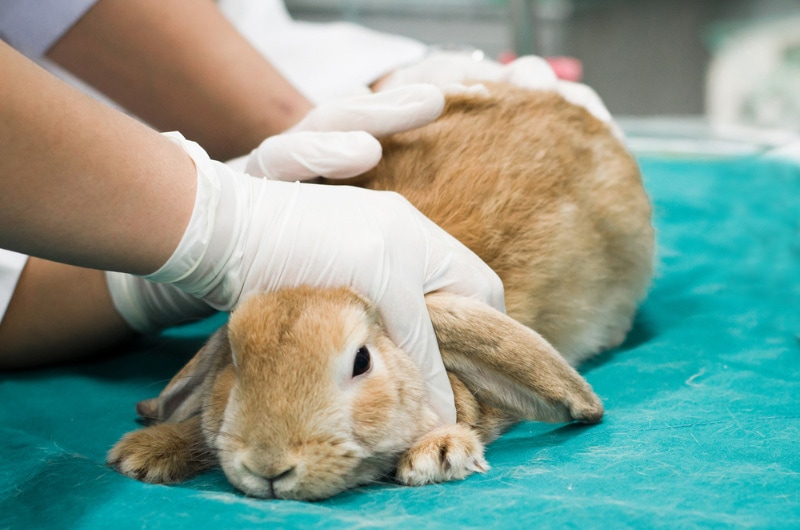
What About Soft Cecotropes?
If it’s just your bunny’s soft cecotropes, you usually need to assess what your furry friend is eating. Some examples of diet that may contribute to soft cecotropes are:
If you can identify one of these causes, you can often eliminate it from the diet to help get your rabbit’s gut health back on track.
Frequently Asked Questions
Can stress cause diarrhea in rabbits?
Stress can definitely cause diarrhea in rabbits. Unfortunately, it can take up to a week for rabbits to develop diarrhea secondary to stress, so it can be difficult to identify the inciting cause.
Stress can cause diarrhea in rabbits in a few different ways. First, adrenaline slows gut motility, which can lead to GI stasis. The cecum can also become less acidic or more alkaline if rabbits aren’t eating their cecotropes. This change in acidity leads to fit dysbiosis, or alterations in the gut microflora.
Will feeding treats to my rabbit cause diarrhea?
Feeding a wide variety of foods to your rabbit can lead to diarrhea. High-sugar fruits or other foods with a higher carbohydrate amount can lead to “bad” bacteria overcrowding the populations of “good” bacteria in the gut.
If you’re offering a treat, it should be a small amount (generally speaking, less than 10% of the diet). Feeding larger amounts is making a rapid change in your rabbit’s food and can cause diarrhea.
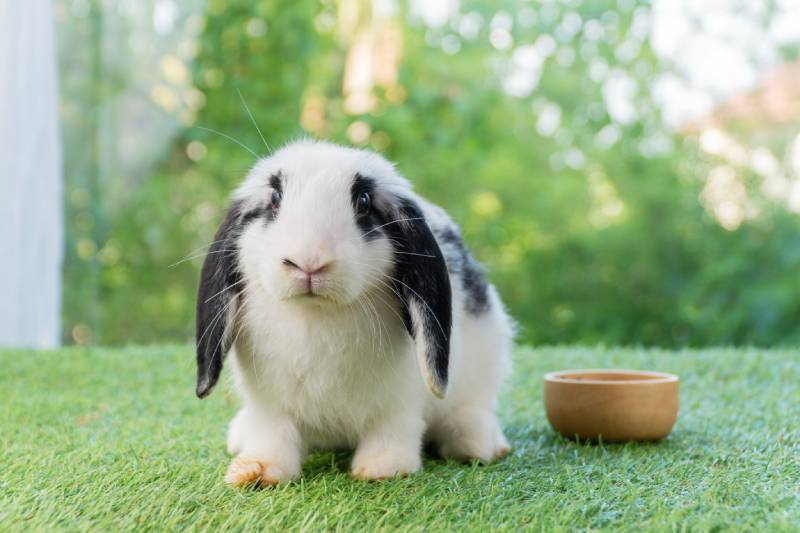
Conclusion
Rabbits are curious creatures, so you’ll need to watch what they eat carefully. If you start to notice softer stools with your rabbit, contact your veterinarian for an exam, especially if they are young or old, making them more at risk for being immunocompromised. While waiting for your appointment, ensure your rabbit eats a complete and balanced diet.
Featured Image Credit: Africa Studio, Shutterstock
The post Why Does My Rabbit Have Diarrhea? 9 Vet-Explained Reasons & Treatments appeared first on Pet Keen.

